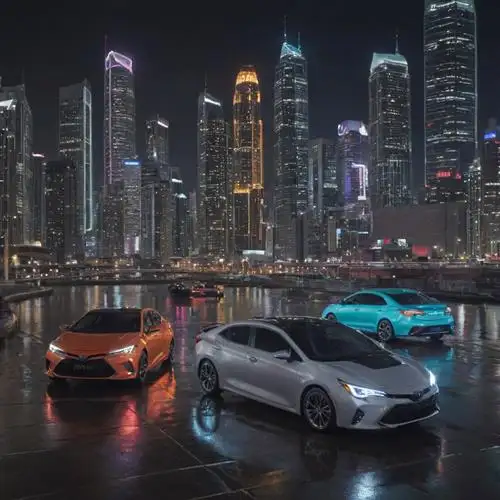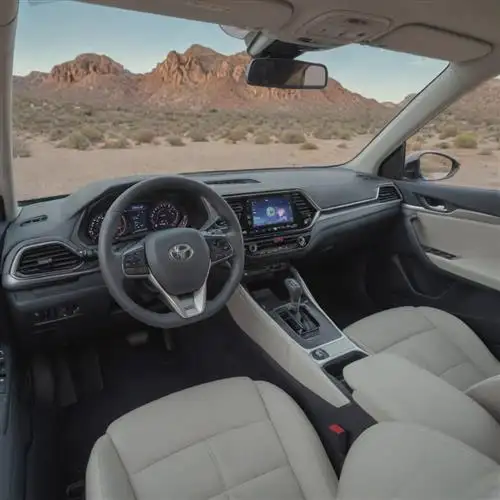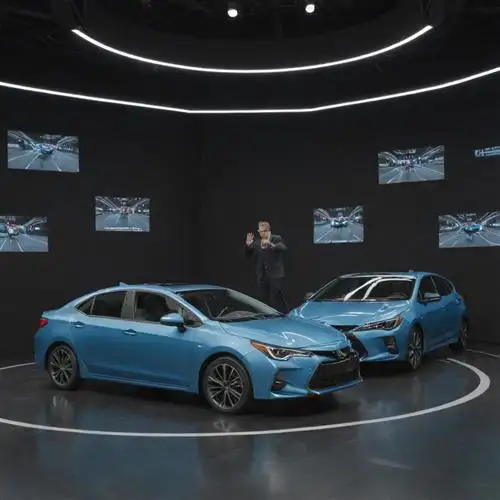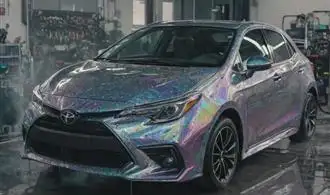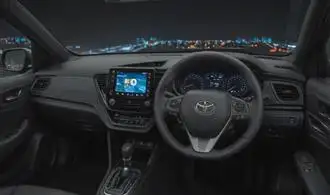
Design and Styling
The Toyota Corolla and the Hyundai Elantra are two of the most popular compact sedans on the market, each offering a unique blend of style, functionality, and performance. When it comes to design and styling, these two vehicles share some similarities, but also have distinct features that set them apart.
The Toyota Corolla's design language is characterized by its clean, modern lines and a more conservative approach. The front end features a prominent grille and sleek headlights that give the car a refined and sophisticated appearance. The overall silhouette is streamlined, with gentle curves and a sloping roofline that contribute to the Corolla's aerodynamic efficiency. The car's proportions are well-balanced, creating a sense of harmony and balance.
In contrast, the Hyundai Elantra boasts a more expressive and dynamic design. The front end features a bold, cascading grille and angular headlights that give the car a more aggressive and contemporary look. The side profile is characterized by sharper creases and a more pronounced beltline, adding a sense of athleticism to the Elantra's appearance. The rear end features a distinctive taillight design that further emphasizes the car's modern and sophisticated styling.
When it comes to interior design, both the Toyota Corolla and the Hyundai Elantra offer well-appointed, comfortable, and practical cabins. The Corolla's interior is characterized by a simple, straightforward layout with high-quality materials and an emphasis on functionality. The Elantra, on the other hand, features a more stylized and technology-focused interior, with a larger infotainment display and a more modern, driver-centric dashboard design.
In terms of exterior dimensions, the Toyota Corolla and the Hyundai Elantra are both compact sedans, but the Elantra is slightly larger in overall length and width, offering a bit more interior space for passengers and cargo. The Corolla, however, is a bit lower in height, which can contribute to a more sporty and dynamic driving experience.
Interior Comfort and Convenience
When it comes to interior comfort and convenience, the Toyota Corolla and Hyundai Elantra offer a similar level of features and amenities. Both vehicles are designed to provide a comfortable and functional driving experience, catering to the needs of modern commuters and families.
The Corolla's interior is known for its spacious and ergonomic layout. The driver's seat offers ample adjustability, allowing for a customized driving position. The front seats provide good support and comfort, even on longer journeys. Rear-seat passengers also benefit from generous legroom and headroom, making the Corolla a practical choice for transporting passengers.
In terms of convenience features, the Corolla is well-equipped. It offers a user-friendly infotainment system with a touchscreen display, providing access to various functions such as navigation, audio controls, and smartphone integration via Apple CarPlay and Android Auto. The climate control system is intuitive and effective, ensuring a comfortable cabin environment year-round.
The Hyundai Elantra, on the other hand, also boasts a well-designed interior with a focus on comfort and convenience. The front seats are supportive and offer good adjustability, while the rear seats provide sufficient legroom and headroom for adult passengers. The Elantra's infotainment system is user-friendly, with a responsive touchscreen and seamless smartphone integration.
One area where the Elantra may have a slight edge is in its range of available convenience features. The Elantra offers optional features like a wireless charging pad, a Bose premium audio system, and a heads-up display, which can enhance the driving experience for some buyers.
Performance and Efficiency
When it comes to the performance and efficiency of the Toyota Corolla and Hyundai Elantra, these two compact sedans offer distinct capabilities that cater to different needs. The Corolla boasts a tried-and-true 1.8-liter four-cylinder engine that delivers a respectable 139 horsepower and 126 lb-ft of torque. Paired with a continuously variable transmission (CVT), the Corolla's powertrain provides a smooth and responsive driving experience, well-suited for daily commutes and city driving. Moreover, the Corolla's fuel economy figures are impressive, with an EPA-estimated 31 mpg in the city and 38 mpg on the highway, making it a budget-friendly and eco-conscious choice.
In contrast, the Hyundai Elantra offers a choice between two engine options. The base 2.0-liter four-cylinder engine produces 147 horsepower and 132 lb-ft of torque, providing a slight performance advantage over the Corolla. Buyers can also opt for a turbocharged 1.6-liter four-cylinder engine, which boasts 201 horsepower and 195 lb-ft of torque, delivering a more spirited driving experience. The Elantra's fuel efficiency is also noteworthy, with an EPA-estimated 33 mpg in the city and 43 mpg on the highway for the base engine, and 28 mpg in the city and 36 mpg on the highway for the turbocharged variant.
When it comes to real-world driving, the Corolla's powertrain delivers a smooth and composed ride, with the CVT providing seamless acceleration and responsive throttle response. The Elantra, on the other hand, offers a more engaging driving dynamic, especially with the available turbocharged engine. The Elantra's suspension tuning and steering feel provide a more spirited and connected driving experience, appealing to those who enjoy a more dynamic commute.
In terms of towing capacity, the Corolla and Elantra are both limited to light-duty tasks, with the Corolla rated for a maximum of 1,500 pounds and the Elantra for up to 1,000 pounds. These figures are typical for compact sedans, as they are not designed for heavy-duty hauling tasks.
Safety and Technology Features
The Toyota Corolla and Hyundai Elantra are both compact sedans known for their affordability, fuel efficiency, and reliable performance. However, when it comes to safety and technology features, the two models diverge in significant ways. The Corolla, with its Toyota Safety Sense suite of advanced safety systems, offers a comprehensive package of driver-assist technologies that can enhance overall driving confidence and accident prevention capabilities.
- Pre-Collision System with Pedestrian Detection: This system uses a forward-facing camera and radar to detect potential collisions with vehicles or pedestrians, and can automatically apply the brakes to help mitigate or avoid the impact.
- Lane Departure Alert with Steering Assist: This feature monitors lane markings and can provide steering assistance to help keep the vehicle centered within the lane, reducing the risk of unintentional lane drifting.
- Automatic High Beams: The Corolla's automatic high beam system can detect oncoming traffic and other vehicles, and automatically switch between high and low beams to optimize visibility without blinding other drivers.
- Dynamic Radar Cruise Control: This adaptive cruise control system can maintain a safe following distance from the vehicle ahead, adjusting the Corolla's speed as needed to maintain a consistent and safe traveling speed.
In contrast, the Hyundai Elantra offers a more basic suite of safety features, with options like forward collision-avoidance assist, lane keeping assist, and driver attention warning available as part of higher trim levels or optional packages. While the Elantra does provide some advanced safety tech, the Corolla's standard Toyota Safety Sense package offers a more comprehensive and integrated safety experience.
When it comes to technology features, the Corolla also holds an advantage over the Elantra. The Corolla comes standard with a 7-inch touchscreen infotainment system, featuring Apple CarPlay and Android Auto compatibility, allowing for seamless integration of smartphone functions and voice controls. The Elantra, on the other hand, offers a smaller 5-inch display as standard, with the larger 8-inch touchscreen reserved for higher trim levels.
Pricing and Value Proposition
The Toyota Corolla and the Hyundai Elantra are two of the most popular compact sedans on the market, offering a balance of affordability, fuel efficiency, and reliable performance. When it comes to pricing and value proposition, the two models have their own unique strengths and considerations.
The Toyota Corolla has a starting MSRP of $20,425, which is slightly higher than the Hyundai Elantra's base price of $19,850. However, the Corolla's reputation for long-term reliability, durability, and excellent resale value often justifies the slightly higher upfront cost. Toyota is known for its meticulous engineering and the Corolla's history of consistent performance and low maintenance requirements can translate to significant savings over the car's lifetime.
In terms of standard features, both the Corolla and Elantra come well-equipped in their base trims. The Corolla offers a 7-inch touchscreen infotainment system, LED headlights, and a suite of advanced safety technologies like automatic emergency braking and lane departure warning. The Elantra, on the other hand, provides a similar array of features, including an 8-inch touchscreen, Android Auto and Apple CarPlay integration, and a robust suite of driver assistance technologies.
When it comes to fuel efficiency, the Corolla has a slight edge, with an EPA-estimated 31 mpg in the city and 40 mpg on the highway, compared to the Elantra's 33 mpg city and 43 mpg highway ratings. This difference can translate to notable savings at the pump over the life of the vehicle, especially for drivers with high annual mileage.
The Corolla's renowned reliability and resale value are also significant factors to consider. Toyota vehicles, in general, tend to hold their value better than many of their competitors, which can be a substantial advantage for buyers who plan to keep their cars for several years or who intend to sell the vehicle in the future. This can offset the Corolla's slightly higher initial price tag.

